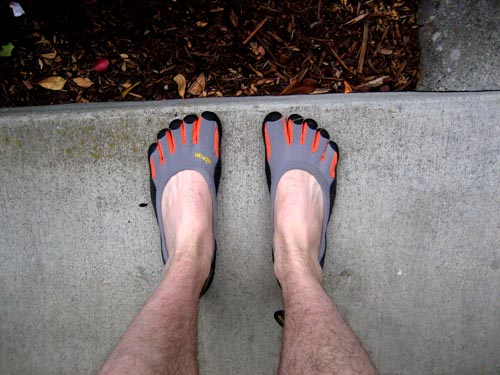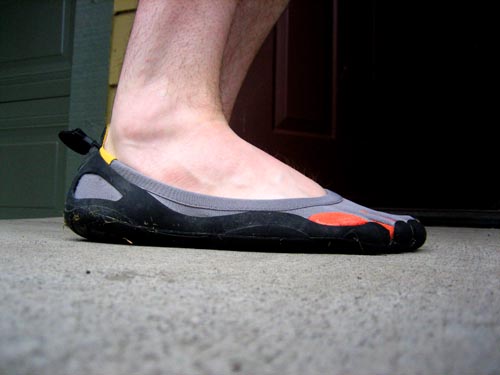FiveFingers
I recently purchased a pair of Vibram FiveFingers after reading several positive reviews and a book extolling the virtues of running barefoot.
If you haven't seen them before, they're basically thin rubber soles that fit around the bottoms of your feet. They have five little "toes" on them that allow your toes to flex independently of the rest of the foot:

The idea is that they are as close to running barefoot as possible, while still keeping you safe from stepping on glass and rocks. Running barefoot is supposedly good because that's how human bodies evolved to run. Typical padded running shoes make it easy to run with wide strides, striking the ground heel-first. This striking action causes lots of stress and problems in your joints, particularly knees and ankles. Running barefoot forces you to run differently since you cannot strike your heel (or else it will hurt, like it is supposed to). While barefoot you automatically run with knees bent, "rolling" your foot from the front to the heel as you step. This extra flexibility reduces joint stress since your legs will automatically bend to accommodate the force of the footfall.
That's the theory anyway. I haven't had the FiveFingers long enough to tell if they will live up to the promise. When I got them I used them on my morning run, of about 3 miles. While running everything felt more or less fine, but afterward I noticed that I had gotten a blister on the bottom of my right foot, and both feet ached for a couple of days (it felt like the foot muscles were sore from not being used, rather than actual foot injuries). Some people recommend gradually switching to barefoot running (starting with only a half mile or mile each day), which sounds like good advice in retrospect. I need to build up calluses in places where I don't usually need them in shoes and socks.
The sensation while wearing them is very interesting. It's not quite like being barefoot, but you "feel" the ground much more than you do with regular shoes. You can really tell the difference between concrete, asphalt, a dirt trail and grass. You also notice little things that you'd normally miss, like sticks and cracks in the sidewalk, as well as temperature differences between different surfaces (cool wet grass vs hot dry asphalt).
I wore them to work one day and got a lot of weird looks. Most people did not know what they were and thought I was crazy. I didn't notice much difference after wearing them for a day at work, so I've stuck with regular shoes since then. Some people claim that it helps to wear them around to daily activities if you suffer from back pain, as they will force you to have more "correct" walking posture.




November 3rd, 2009 - 11:07
Hi, Eric! I like those! I wonder how supportive they’d be during a good, brisk, power walk?
November 8th, 2009 - 21:46
Hi! That’s a good question – I haven’t tried them while power-walking, but I’d guess that it’d be pretty tough on your feet until you get used to it. Power-walking seems to involve striking your heel fairly hard, which is a lot easier in shoes with lots of rubber padding.
November 13th, 2009 - 09:53
i’ve heard some mixed things on the validity of the bearfoot running movement, but its def seems to be an emerging trend. Nike Free running shoes were designed to minimize lots of the material. Keep us updated on how this works for you.